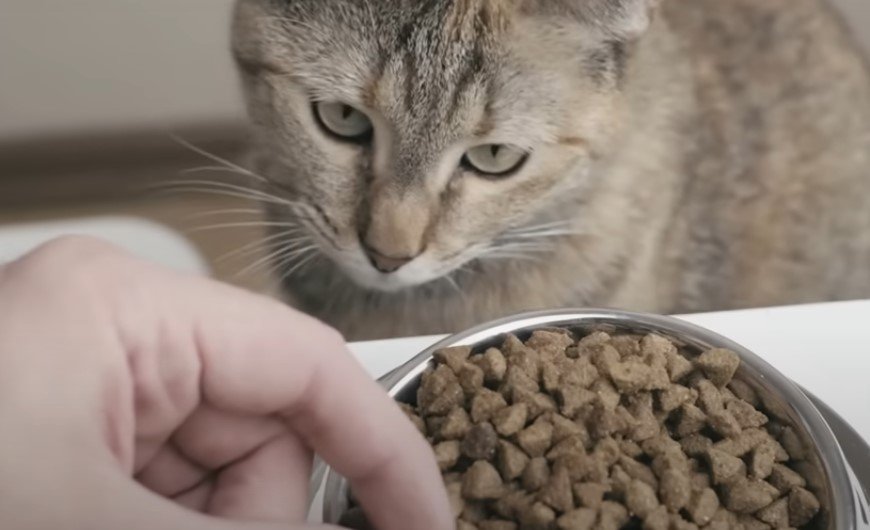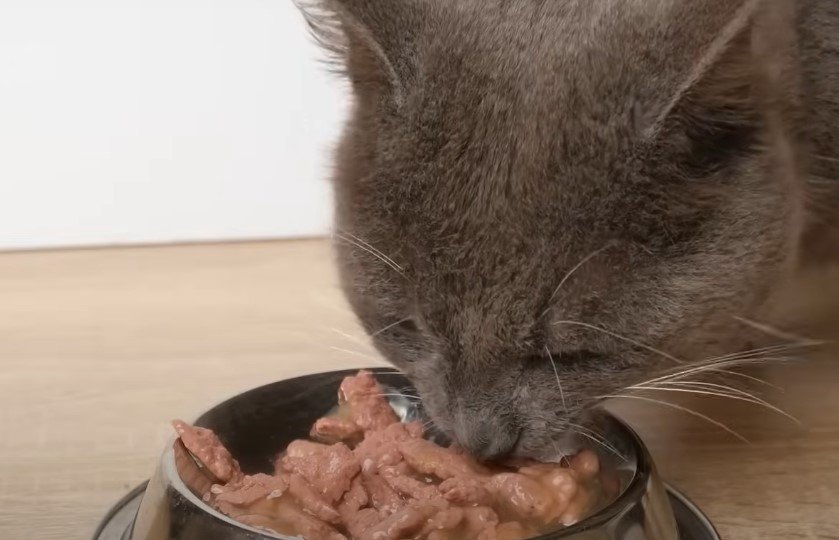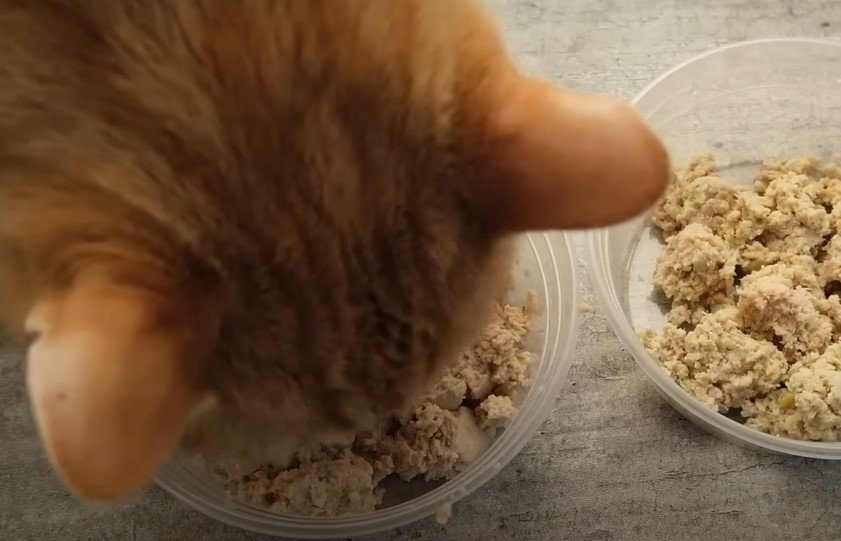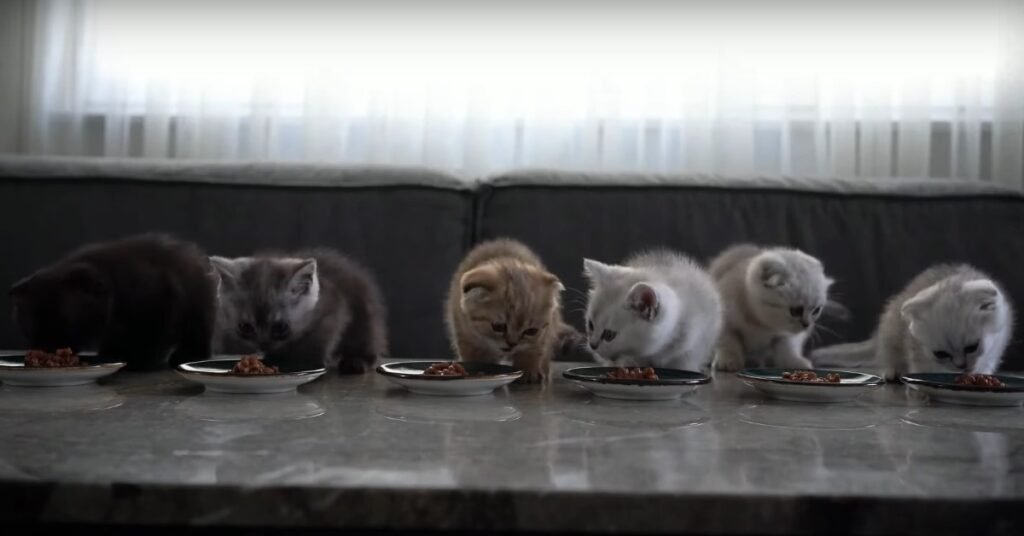
Are your older cats frequently sneaking into the kitten’s food bowl? You’re not alone! Many cat owners struggle to keep older cats away from tasty kitten food.
Keeping your cats on the right diet is essential for their health and happiness. If you’re wondering how to stop older cats from eating kitten food, you’re in the right place!
If you are in a hurry, here’s a simple answer: Keep older cats away from kitten food by feeding them in separate areas, using timed feeders, giving them the right food, and asking a vet for help.
Now let’s dive into the details and explore some practical tips to ensure your senior cat sticks to a diet that supports their health, and why this behavior happens.
Why Do Older Cats Eat Kitten Food?
To stop older cats from eating kitten food, it’s important to know why they like it. Here are the top reasons:
- Kitten Food Smells Better
Kitten food is rich in nutrients and has a strong, appealing smell. This is hard for older cats to resist. - Higher Calories and Protein
Kitten food has lots of calories and protein to help kittens grow. Older cats, especially those lacking proper nutrition, might want this extra energy. - Curiosity or Boredom
Older cats may explore and eat kitten food out of curiosity or boredom, especially if it’s easily accessible. - Hunger or Dietary Needs
If an older cat feels hungry or their diet is not satisfying, they may turn to kitten food as an alternative.
Understanding Food Stealing: A Behavioral Perspective
Cats have an instinct to protect their food. In a multi-cat house, older cats may feel the need to compete for meals. They might see kitten food as a special treat and try to eat it first.
Territorial behavior also plays a role. Some older cats eat kitten food to show dominance. It’s their way of claiming space and control.
Understanding why your cat behaves this way is the first step to stopping it. Recognizing their instincts helps you manage their feeding habits more effectively.
Why Older Cats Shouldn’t Eat Kitten Food
Older cats can eat kitten food only for a short time. Feeding older cats kitten food may seem harmless, but it can cause problems if they eat it for a long time. Here are some problems:
Health Issues: Kitten food is high in calories and nutrients for growth. For older cats, this can cause health problems like diabetes, dental issues, kidney strain, and digestive upset.
- Weight Gain: Kitten food is high in calories and protein. The extra calories in kitten food help underweight cats gain weight quickly, but most of the time, they lead to obesity.
- Nutritional Imbalance: Older cats need food that supports their aging joints, organs, and overall health. Kitten food lacks antioxidants, omega-3s, and joint-supporting nutrients, which are essential for senior cats.

How to Stop Older Cats from Eating Kitten Food: 6 Vet-Approved Tips
Here are six practical ways to stop your older cat from eating kitten food:
Understand Why They Do It
Older cats may eat kitten food out of curiosity, preference, or hunger. Knowing the reason helps you address the issue better.
Use Separate Feeding Areas
If you have multiple cats, it’s important to give them separate feeding areas. Kittens and older cats need different food. Kitten food has nutrients that help them grow, while older cat food is made for maintenance.
If cats eat from the same bowl, older cats may take kitten food, and kittens may not get enough. This can lead to health problems. Separate feeding spots help each cat get the right nutrition.
It also reduces stress and food fights. Cats feel safer when they eat alone. Set up quiet spots for each cat to eat peacefully.
Stick to a Feeding Schedule
Set fixed mealtimes for both cats. Feed your kitten and older cat at different times. This stops the older cat from stealing the kitten’s food.
Kittens need smaller, frequent meals. Feed the kitten an hour before or after the older cat. It may take time, but this plan helps keep things calm and solves food fights.
Try Microchip Feeders
Microchip pet feeders can stop food stealing. They open only for the pet with the right chip or tag. This makes sure each pet gets their food. It may not fully stop an older cat from taking the kitten’s food, but it helps a lot.
Engage Your Older Cat
Distract your senior cat during feeding times with interactive toys and treats to keep them occupied. Puzzle feeders and treat-dispensing balls can challenge their minds and keep them entertained.
These activities help redirect their focus and prevent boredom. Cats enjoy problem-solving, and rewarding them with treats makes the experience fun. Rotate toys regularly to keep their interest.
Introduce new toys gradually and observe how your cat responds. Some may need time to adjust, while others may engage right away. Consistency and patience will help keep your older cat mentally sharp and satisfied.
Consult Your Vet
If you want to know how to stop older cats from eating kitten food, consulting with a vet is a smart step. A vet can check if your cat is missing nutrients or has health issues. Sometimes, older cats crave kitten food due to an underlying problem.
A vet can also help you choose the right diet. They may recommend a special food to keep them healthy and away from kitten food.
Every cat is different. A vet can give advice based on your cat’s health, age, and behavior. This ensures they get the right nutrition and stay healthy.

Benefits of Feeding Your Older Cat Senior Cat Food
- Balanced Nutrition – Provides the right amount of protein, vitamins, and minerals for aging cats.
- Weight Control – Helps prevent weight gain, unlike calorie-rich kitten food.
- Supports Digestion – Easier for older cats to digest and reduces stomach problems.
- Keeps Skin and Fur Healthy – Supports a shiny coat and reduces shedding.
- Supports Joints and Movement – Helps older cats stay active and move easily.
- Improved Energy Levels – Keeps your cat active without unnecessary fats and calories.
Switch your cat’s food slowly and watch how they react to it.
Final Thoughts
Stopping older cats from eating kitten food is important for their health. Kitten food has more calories and nutrients made for growing kittens, not adult cats. If older cats eat it often, they may gain weight or miss out on the right nutrients.
To prevent this, feed your cats in separate areas, use automatic feeders, or set a feeding schedule. If your older cat keeps trying to eat kitten food, consult a vet. They might need more nutrients.
Feeding your cats the right food will help them stay healthy and happy.
FAQ:
1. Why does my older cat prefer kitten food over their own food?
Kitten food is rich in protein, fats, and has a stronger smell, making it more appealing. Older cats might crave these nutrients if their diet is lacking or if they find the kitten’s food tastier.
2. Can kitten food harm my senior cat?
Yes, kitten food has higher calories and nutrients designed for growth, not for aging cats. Regular consumption can lead to obesity, diabetes, kidney issues, and digestive problems in senior cats.
3. How can I feed my kitten without my older cat stealing their food?
Feed them in separate rooms or use microchip feeders that open only for the kitten. You can also establish different feeding schedules to prevent food stealing.
4. What should I do if my older cat refuses to eat their own food?
Try switching to a high-protein, flavorful senior cat food. Warming up the food or adding wet food can make it more appealing. If refusal continues, consult a vet to rule out health issues.
5. Will my older cat stop eating kitten food over time?
With consistent training and a proper feeding routine, most older cats will stop trying to eat kitten food. However, if the habit continues, adjusting their diet or using physical barriers may be necessary.

